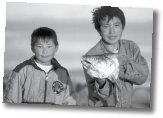Should we make up a list of questions for the interview?
- You will plan a list of questions, but the interviewer should think of those
questions as a guideline only, not a rigid list that must be followed. Often the
storyteller will answer your questions without you ever asking them. Take time
at the end of each interview to check off all your questions that were covered
in that session.
- Sometimes the interview will be like a monologue, with the storyteller doing
most of the talking and the interviewer just listening and responding quietly.
Other times an interviewee may be quiet and shy and the interviewer will
need to encourage him or her to share information.
- You may have prepared tough questions about emotional issues, but you won’t
be able to ask those questions unless the interviewee seems comfortable and
ready to share this information. It may be the third or fourth meeting before
he or she volunteers sensitive information.
- You will need to respect silences or pauses, to give the storyteller time to
think.
- Remember that people who know very little about the topic may be listening
to the recorded interview years later, so you will need to ask obvious questions
and ask for detailed descriptions. Imagine that your grandchildren will be
listening to the interview – in 25 years. Maybe they will have never had the
opportunity to speak to a unilingual Elder and some of them may have never
seen certain tools, clothing or other objects from the past.
- If the interviewee doesn’t offer much information on a topic, the interviewer
can use the ‘five W’s’ to encourage more detail – who, what, where, when,
how, why.
- Ask open-ended, neutral questions that don’t limit or lead the response. (See
Planning Interview Questions, on the next page.)


